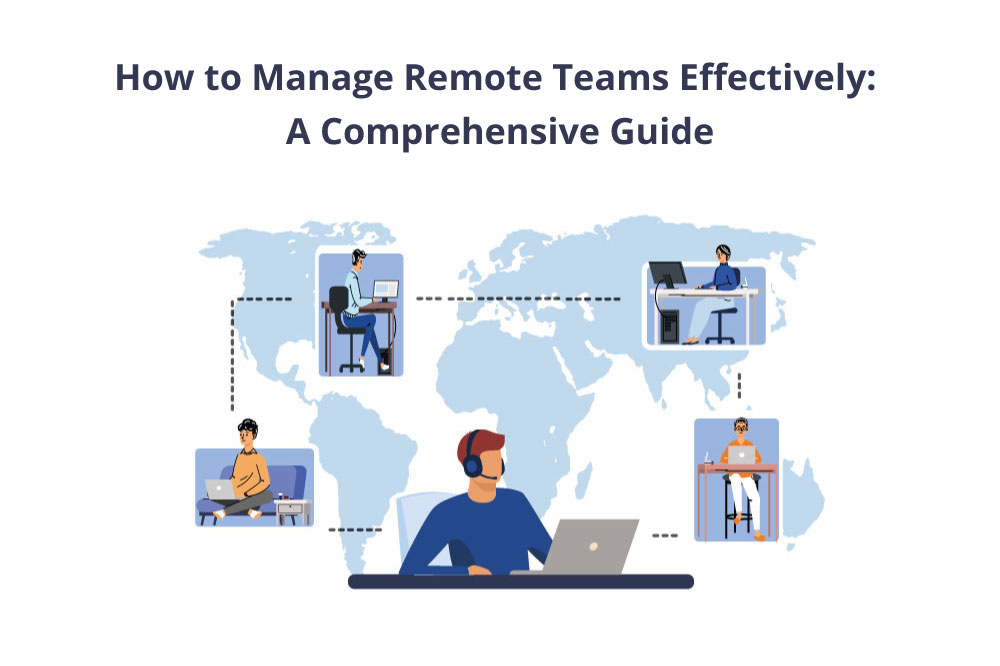How to Manage Remote Teams Effectively: A Comprehensive Guide

The sudden shift to remote work has pushed many businesses to manage remote teams for the first time. Managers may find it challenging to monitor and ensure employees are productive, focused, and aligned. However, by establishing a strong remote work culture, policies, and training, managers can avert predictable crises and keep their remote teams engaged, creative, and contributing to the overall productivity and success of the organization.
Remote Team Challenges
Before we dive into the tips to manage remote teams effectively, it’s important to be aware of the challenges that employees may face.
- Lack of personal supervision: In physical offices, managers can conduct face-to-face meetings to get updates on progress and identify any potential problems. However, with remote teams, this is not always possible. This can be a challenge, especially if team members are located in different time zones.
- Lack of access to information: Remote employees may have difficulty accessing information about ongoing projects, especially if it is not stored in a central location. Additionally, it can be difficult for remote team members to stay up-to-date on the latest company news and developments.
- Lack of trust: Some managers may be skeptical about allowing employees to work from home, fearing that they will be less productive. This lack of trust can create a negative work environment and make it difficult to build a cohesive team.
- Social isolation: Loneliness and isolation are common challenges for remote employees. Without the regular social interaction of an office setting, remote employees may feel disconnected from their team and the company as a whole.
- Distractions at home: Working from home can be challenging, especially if there are children or other distractions present. Additionally, some remote employees may not have access to the same resources and equipment that they would have in an office setting.
Manage Remote Team Effectively
Despite the challenges, there are a number of things that managers can do to effectively manage remote teams.
Remote Work Management Tips
Here are a few tips:
- Have daily check-in meetings. Daily check-in meetings are a great way to stay connected with your remote team and get updates on their progress. These meetings can be held one-on-one or with the entire team.
- Use the right technology and tools. There are a number of tools and technologies available to help managers manage remote teams. These tools can help with communication, collaboration, project management, and more.
- Establish rules of engagement. It’s important to set clear expectations for your remote team. This includes things like communication hours, meeting protocols. Encourage privacy, work-life balance, and cultural sensitivity while providing a conflict resolution process. Continually gather feedback and adapt rules to maintain an effective and harmonious remote team environment.
Remote Work Best Practices
- Delegate responsibilities: When delegating tasks, it’s important to consider the skills and experience of each team member. It’s also important to provide clear instructions and deadlines.
- Focus on outcomes, not activity. Instead of micromanaging your team members, focus on the results that you want them to achieve.
- Offer encouragement and emotional support. It’s important to show your remote team members that you are there for them and that you appreciate their hard work. Managers can offer encouragement and emotional support by providing regular feedback, celebrating successes, and being available to answer questions.
Remote Team Productivity
- Provide opportunities for remote social interaction: Remote employees can still have a strong sense of community, even if they are not physically located in the same place. Managers can help foster this sense of community by creating opportunities for remote team members to socialize virtually.
- Remote teams thrive when they are free to work in their own style, using their unique skills and talents to find the best way to get the job done. When managers give remote teams this freedom, they are more likely to be productive and engaged.
Conclusion
Managing remote teams can be challenging, but it is possible to do it effectively. By following the tips above, managers can create a positive and productive work environment for their remote team members.
Visit Centizen Talent Hub today to learn more about our remote hiring services and how we can help you build a dedicated development team.
Centizen
A Leading IT Staffing, Custom Software and SaaS Product Development company founded in 2003. We offer a wide range of scalable, innovative IT Staffing and Software Development Solutions.
Contact Us
USA: +1 (971) 420-1700
Canada: +1 (971) 420-1700
India: +91 63807-80156
Email: contact@centizen.com
Our Services
Products
Contact Us
USA: +1 (971) 420-1700
Canada: +1 (971) 420-1700
India: +91 63807-80156
Email: contact@centizen.com






